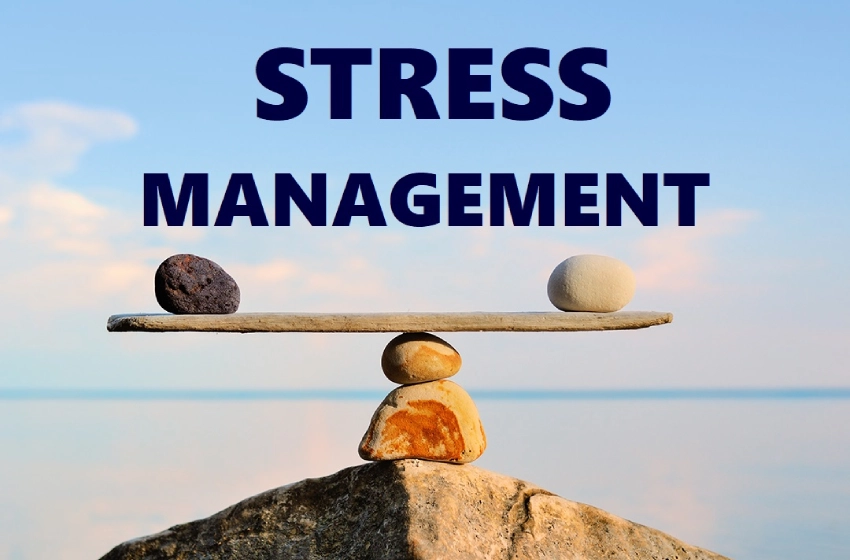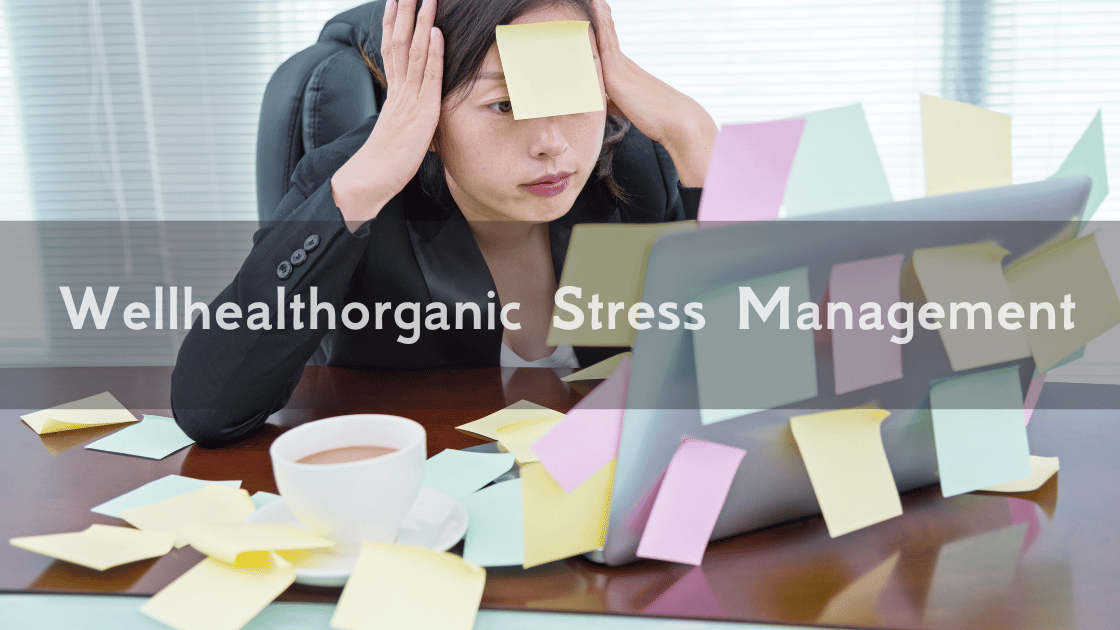Wellhealthorganic offers effective stress management tips to improve mental well-being. Their holistic approach includes diet, exercise, and mindfulness.
Stress is a common issue in today’s fast-paced world. Managing stress effectively is crucial for maintaining overall health. Wellhealthorganic provides valuable insights and practical tips for stress management. They emphasize the importance of a balanced diet rich in nutrients, regular physical activity, and mindfulness practices like meditation.
By incorporating these strategies into your daily routine, you can significantly reduce stress levels. This holistic approach not only improves mental well-being but also enhances physical health. Prioritizing stress management can lead to a happier, more productive life.
Introduction To Stress Management
Stress affects everyone. Managing stress is crucial for a healthy life. Wellhealthorganic offers effective techniques for stress management. These techniques help in reducing stress and improving health.
The Impact Of Stress On Health
Stress can harm your body and mind. It can cause headaches, fatigue, and sleep problems. Long-term stress can lead to serious health issues, such as heart disease and depression.
Here are some common effects of stress on health:
- Physical symptoms like headaches and muscle tension.
- Mental symptoms like anxiety and irritability.
- Behavioral changes such as overeating or under-eating.
Essentials Of Wellhealthorganic Approach
Wellhealthorganic focuses on holistic stress management. Their approach includes natural remedies and lifestyle changes.
| Essential Method | Description |
|---|---|
| Herbal Supplements | Natural herbs like ashwagandha and chamomile reduce stress. |
| Mindfulness Meditation | Practicing mindfulness helps calm the mind and reduce anxiety. |
| Balanced Diet | A healthy diet improves overall well-being and reduces stress. |
Wellhealthorganic also recommends regular exercise. Physical activity boosts mood and reduces stress hormones.
Adopting these techniques can lead to a stress-free, healthier life.
Identifying Your Stress Triggers
Understanding what causes your stress is the first step in managing it. Everyone experiences stress differently. Identifying your stress triggers can help you take control. This guide will help you discover what stresses you out.
Personal Stress Assessment
Start by conducting a personal stress assessment. This means reflecting on recent stressful events. Write down each event and how it made you feel. Use a journal to keep track. This helps in pinpointing patterns.
- Record the date and time of the event.
- Note what happened.
- Write down your immediate reaction.
- Describe the physical symptoms you felt.
- Reflect on how you handled the situation.
Review your journal weekly. Look for repeating stressors. This practice helps in identifying common triggers.
Common Sources Of Stress
Many people share similar sources of stress. Recognizing these can help in understanding your own triggers.
| Source of Stress | Description |
|---|---|
| Work | Long hours, tight deadlines, difficult coworkers. |
| Family | Arguments, financial issues, health problems. |
| Health | Illness, lack of sleep, poor diet. |
| Social | Peer pressure, social media, loneliness. |
| Environmental | Noise, pollution, crowded spaces. |
Consider each category. Reflect on which one affects you the most. This will guide you in managing stress better.
Identifying stress triggers is crucial. Use personal assessments and common sources to find yours. This knowledge is the key to better stress management.
Strategy 1: Mindful Meditation
Mindful meditation is a powerful tool for stress management. It helps clear the mind and improve focus. Engaging in mindful meditation can bring numerous benefits to your life. Here, we will explore its benefits and provide techniques for beginners.
Benefits Of Meditation
Meditation offers many advantages for both mental and physical health. Here are some key benefits:
- Reduces stress: Meditation helps lower cortisol levels, which reduce stress.
- Improves concentration: Regular practice enhances your ability to focus.
- Boosts emotional health: Meditation promotes a positive outlook and emotional stability.
- Enhances self-awareness: It helps you understand yourself better.
- Promotes better sleep: Meditation can improve sleep quality and duration.
Techniques For Beginners
Starting with meditation can be simple. Here are some techniques for beginners:
- Find a quiet place: Choose a silent spot where you won’t be disturbed.
- Get comfortable: Sit or lie down in a comfortable position.
- Close your eyes: Gently close your eyes to minimize distractions.
- Focus on your breath: Pay attention to your breathing pattern. Notice each inhale and exhale.
- Observe your thoughts: Allow thoughts to come and go without judgment.
- Start small: Begin with 5-10 minutes and gradually increase the duration.
Consistency is key in meditation. Practice daily for the best results.
Strategy 2: Balanced Nutrition
Stress affects our body and mind. Balanced nutrition can help manage stress. Eating the right foods can boost mood and energy. Here we explore how balanced nutrition can combat stress.
Foods That Combat Stress
Some foods can reduce stress levels. They contain nutrients that help the body manage stress better.
- Dark Chocolate: Dark chocolate can reduce stress hormones. It also improves mood.
- Avocados: Avocados are rich in healthy fats. They help lower blood pressure.
- Nuts and Seeds: Nuts and seeds provide magnesium. Magnesium helps calm the nervous system.
- Leafy Greens: Leafy greens are high in folate. Folate helps produce mood-regulating neurotransmitters.
- Blueberries: Blueberries are rich in antioxidants. They help protect the body from stress.
Creating A Stress-relieving Diet
Creating a stress-relieving diet involves choosing the right foods and habits. This can make a big difference in stress levels.
Here’s a simple table to guide your diet:
| Meal | Foods |
|---|---|
| Breakfast | Oatmeal with berries and nuts |
| Lunch | Grilled chicken salad with avocado |
| Snack | Greek yogurt with honey |
| Dinner | Salmon with steamed vegetables |
Follow these tips for a stress-relieving diet:
- Eat small, balanced meals throughout the day.
- Include a variety of fruits and vegetables.
- Avoid processed foods and sugary snacks.
- Stay hydrated by drinking water.
Adopt these habits for better stress management and overall health.
Strategy 3: Regular Physical Activity
Engaging in regular physical activity is a powerful way to manage stress. It improves both mental and physical health. This strategy helps release tension and boosts mood. Let’s dive into how exercise can be an effective stress reliever and how to find the right activity for you.
Exercise As A Stress Reliever
Exercise is a natural way to reduce stress. It increases endorphins, the body’s feel-good hormones. These hormones help improve mood and reduce anxiety. Physical activity also lowers the levels of stress hormones like cortisol.
Regular exercise provides a break from daily stressors. It offers a chance to clear your mind and focus on something positive. Activities like jogging, swimming, or yoga can be especially calming. These exercises help in releasing pent-up energy and reducing tension.
Physical activity also promotes better sleep, which is crucial for stress management. Better sleep helps you feel more rested and less irritable. Exercise also boosts self-confidence. Feeling stronger and fitter can improve your overall outlook on life.
Finding The Right Activity For You
Choosing the right physical activity is important. It should be something you enjoy and can stick with. Here are some tips to find the best exercise for you:
- Consider Your Interests: Pick an activity you find fun. If you enjoy dancing, consider a dance class.
- Assess Your Fitness Level: Choose an activity that matches your current fitness level. Start with something easy like walking.
- Think About Your Schedule: Find an activity that fits into your daily routine. Short, daily workouts can be more effective than longer, less frequent ones.
- Try Different Activities: Experiment with various exercises to see what you enjoy most. You might find a new passion in cycling or hiking.
Here’s a simple table to help you choose an activity:
| Activity | Benefits | Suitability |
|---|---|---|
| Walking | Easy, Low Impact | Beginners |
| Running | High-Intensity, Cardio | Intermediate |
| Yoga | Flexibility, Relaxation | All Levels |
| Swimming | Full Body, Low Impact | All Levels |
Finding the right activity can turn exercise into a rewarding part of your routine. This makes it easier to stick with and enjoy the benefits of reduced stress.
Strategy 4: Quality Sleep
Quality sleep is crucial for managing stress effectively. Our bodies and minds need rest to function properly. Without enough sleep, stress levels can rise, affecting our health and daily lives. Let’s dive into why quality sleep matters and how you can achieve it.
The Sleep-stress Cycle
Sleep and stress are deeply connected. Poor sleep increases stress. Increased stress makes it hard to sleep. This cycle can be tough to break. Understanding this relationship is key to managing stress.
When you don’t sleep well, your body produces more stress hormones. These hormones make you feel anxious and overwhelmed. This anxiety can prevent you from falling asleep, creating a vicious cycle. Breaking this cycle is essential for stress management.
Tips For Better Sleep
Follow these tips to improve your sleep quality:
- Stick to a Sleep Schedule: Go to bed and wake up at the same time every day, even on weekends.
- Create a Bedtime Routine: Develop a relaxing routine before bed. This can include reading, taking a warm bath, or practicing deep breathing.
- Make Your Bedroom Sleep-Friendly: Keep your bedroom cool, dark, and quiet. Use a comfortable mattress and pillows.
- Avoid Screens Before Bed: The blue light from screens can interfere with your sleep. Turn off devices at least an hour before bedtime.
- Watch What You Eat and Drink: Avoid heavy meals, caffeine, and alcohol before bed. These can disrupt your sleep.
- Exercise Regularly: Regular physical activity can help you fall asleep faster and enjoy deeper sleep. Avoid vigorous exercise close to bedtime.
Consider keeping a sleep diary to track your habits. This can help you identify patterns and make necessary adjustments. Remember, quality sleep is a powerful tool in your stress management arsenal.
Strategy 5: Social Support
Stress can take a toll on your physical and mental health. Finding effective ways to manage stress is essential. Strategy 5: Social Support emphasizes the importance of relationships and building a support network to manage stress better.
The Role Of Relationships
Healthy relationships play a crucial role in stress management. Positive interactions with family and friends can help reduce stress levels. Sharing your feelings with loved ones can provide emotional relief. Supportive relationships can make challenges feel more manageable.
Having someone to talk to can ease feelings of isolation. Close relationships offer a sense of belonging and security. These feelings can buffer the effects of stress.
Building A Support Network
Creating a strong support network is vital for effective stress management. Here are some steps to build a robust support system:
- Identify your support system: List family, friends, and colleagues who can offer support.
- Communicate openly: Share your thoughts and feelings with trusted individuals.
- Be available: Offer support to others, creating a reciprocal relationship.
- Join groups: Participate in community or interest-based groups to meet new people.
- Seek professional help: Consider therapy or counseling if needed.
Maintaining a support network requires effort. Regular communication and spending time with loved ones are key. Building and nurturing these connections can significantly alleviate stress.
| Benefit | Description |
|---|---|
| Emotional Support | Sharing feelings reduces emotional burden. |
| Practical Support | Help with tasks can reduce stress. |
| Encouragement | Positive reinforcement boosts morale. |
| Advice | Guidance can provide new perspectives. |
Incorporating social support into your stress management strategy can lead to a healthier, happier life. Remember, strong relationships and a robust support network are invaluable tools in managing stress.

Credit: myflexbot.co.uk
Integrating Strategies Into Daily Life
Learning to manage stress is crucial for a healthy life. Wellhealthorganic offers various strategies to help you. Integrating these strategies into your daily routine can make a big difference. This section will guide you on how to create a personalized plan and stay motivated.
Developing A Personalized Plan
Creating a personalized plan is the first step. Everyone’s stressors are different. So, a one-size-fits-all approach won’t work. Here are some steps to develop a customized plan:
- Identify your stressors: Write down what causes you stress.
- Choose your strategies: Pick techniques that resonate with you. This could be meditation, exercise, or hobbies.
- Set realistic goals: Start with small, achievable goals. Gradually increase them as you progress.
Maintaining Consistency And Motivation
Consistency is key to effective stress management. Here are some tips to maintain it:
- Create a routine: Incorporate stress-relief activities into your daily schedule.
- Track your progress: Keep a journal to note improvements and setbacks.
- Reward yourself: Celebrate small victories to stay motivated.
Staying motivated can be challenging. Here are a few suggestions:
| Tips | Benefits |
|---|---|
| Join a support group | Share experiences and get encouragement |
| Seek professional help | Get expert advice tailored to your needs |
| Stay positive | Maintain a positive outlook to reduce stress |
Monitoring Progress And Making Adjustments
Effective stress management involves continuous monitoring and adjustments. Tracking your progress helps you understand what works best. This approach ensures you stay on the right path.
Setting Realistic Goals
Setting realistic goals is crucial for stress management. Unrealistic goals can lead to frustration and increased stress. Start by identifying small, achievable objectives.
- Break down large tasks into smaller steps.
- Set specific, measurable goals for each step.
- Celebrate small victories to stay motivated.
Use a table to track your goals and progress. This helps you stay organized and focused.
| Goal | Start Date | End Date | Progress |
|---|---|---|---|
| Exercise 3 times a week | Jan 1 | Jan 31 | 75% |
| Meditate daily | Jan 1 | Jan 31 | 90% |
When To Seek Professional Help
Sometimes, managing stress on your own isn’t enough. Seeking professional help can be a wise decision.
- Persistent feelings of anxiety or depression.
- Inability to manage daily tasks due to stress.
- Physical symptoms like headaches or insomnia.
Consulting a therapist or counselor can provide you with tailored strategies. These professionals can offer support and guidance.
Remember, seeking help is a sign of strength, not weakness.

Credit: india.parhlo.com
Frequently Asked Questions
What Are The 5 A’s Of Stress Management?
The 5 A’s of stress management are: Avoid, Alter, Adapt, Accept, and Assert. Avoid unnecessary stress. Alter your situation. Adapt to the stressor. Accept what you can’t change. Assert yourself.
How To Reset Your Body From Chronic Stress?
Resetting your body from chronic stress involves regular exercise, adequate sleep, healthy eating, mindfulness practices, and social connections.
What Is The Most Effective Therapy For Stress Management?
The most effective therapy for stress management is cognitive-behavioral therapy (CBT). It helps identify and change negative thought patterns.
What Are The 4 A’s Of Stress Management?
The 4 A’s of stress management are Avoid, Alter, Accept, and Adapt. Avoid unnecessary stress, alter situations, accept what you can’t change, and adapt to the stressor.
Conclusion
Effective stress management is crucial for a healthy life. Utilizing these techniques can significantly improve your well-being. Regular practice of mindfulness, exercise, and healthy eating can reduce stress. Prioritize your mental health with Wellhealthorganic’s expert tips. Start today and experience a more balanced, stress-free life.










Leave a Reply